Information/Write-up
Bob Lucier stands as one of Canada’s most respected pedal steel guitarists, a player whose tone, touch, and musical judgment have been heard across television, radio, records, and live stages for more than five decades. His sound became a defining element of Canadian country music during the 1970s and beyond, and his name remains closely associated with the craft and discipline of the pedal steel.
Born Robert Vincent Lucier on a farm in the small village of Chessoning, Ontario, he moved with his family to nearby Sturgeon Falls as a toddler. Northern Ontario’s country radio stations, touring shows, and early television broadcasts provided his first musical exposure, giving him a steady stream of steel guitar, fiddle, and country harmony long before he entered the professional world.
Lucier came into the pedal steel just as the instrument was reaching its modern form. He was part of the first Canadian generation to explore its broader melodic possibilities — not only as background colour, but as an instrument capable of shaping the musical direction of a song. By the late 1960s he was performing regularly in clubs and dance halls, developing the clean attack, intonation, and phrasing that soon made him a sought-after accompanist. Singers valued his ability to support a vocal line without crowding it, and to elevate a song through concise, well-placed parts.
His national profile grew in the 1970s when he became the resident steel guitarist on CBC’s long-running Tommy Hunter Show. The program served as the central platform for country music in Canada, and Lucier’s weekly presence placed him at the centre of performances with artists from both Canada and Nashville. His work on the show earned respect from many of the instrument’s leading American players — including Curly Chalker, Lloyd Green, John Hughey, and Buddy Emmons — who recognized the precision and musical judgment in his playing.
A key part of Lucier’s sound came from his long association with Ed Fulawka, the Ontario steel-guitar builder whose handcrafted instruments later became known worldwide. Lucier was one of Fulawka’s earliest and most visible players, and the clear sustain and singing upper register of those guitars became closely tied to his studio and broadcast work.
Before and during his television years, Lucier established himself as a prolific session musician. Over the course of his career he played on more than a thousand recording dates, ranging from commercial country releases to CBC projects, independent albums, and advertising work. His ability to craft a short turnaround, outline harmony with precision, or create atmosphere with minimal notes made him one of the most dependable steel players in the country.
Lucier’s own recording legacy centres on Nerves of Steel, released by the Canadian Talent Library in 1977 and recorded at Manta Sound in Toronto. The album brought together major studio figures of the day — including Doug Riley, Tom Szczesniak, Jack Zaza, Stephanie Taylor, Judy Tate, and a full string section — under producer and arranger Bobby Edwards. The record remains one of the best-known steel-focused albums produced in Canada, and a clear document of Lucier’s melodic and textural approach to the instrument.
He remained active as a live musician for decades. For many years he led his own group, Magnum, with vocalist Kurk Bernard, pianist Mel Aucoin, guitarist Darren Lachance, and other Ontario players. Their long-running residency at the Waterdown Legion became a winter staple, drawing regular audiences who came specifically to hear Lucier in a more extended, improvisational setting than television or studio work allowed.
Outside of music, Lucier built a parallel career as a cabinetmaker — a craft that demanded the same patience, precision, and attention to detail that defined his playing. Within the steel-guitar community he became a mentor to younger musicians, and he remained a generous source of guidance and technique throughout his life. Family photographs of Lucier teaching licks to his grandson Zachary capture a side of him that friends and colleagues often underline: steady, patient, and committed to passing the music forward.
Lucier and his wife Connie made their home in Clarkson, Ontario, where they raised their two sons, Mark and Greg, while he balanced a demanding schedule of studio work, touring, and weekly television broadcasts.
-Robert Williston
Bob Lucier: steel guitar
Tom Szczesniak: bass
Bob McLaren: drums
Doug Riley: piano
Bob Mann: guitar
Brian Russell: guitar
Jim Pirie: guitar
Jack Zaza: oboe, flute, piccolo flute, mouth organ, spoons
Brian Leonard: vibraphone, marimba, percussion
Peter Schenkman: cello
Albert Pratz: violin solos
Andrew Benac: violin
Beauna Neilson: violin
Bill Richards: violin
Gerrard Kantarjian: violin
Victoria Richards: violin
Stanley Solomon: viola
Walter Babiak: viola
Diane Pirie: backing vocals
Judy Tate: backing vocals
Stephanie Taylor: backing vocals
Arranged by Bobby Edwards; and Tom Szczesniak (Too High)
Produced and conducted by Bobby Edwards
Executive producer: Mal Thompson
Engineered and mixed by Hayward Parrott
Assistant engineer: Sy Potma
Recorded at Manta Sound, Toronto, Ontario, 1976
Manufactured by Canadian Talent Library
Lacquer cut by Cub
Lacquered by RCA
Photos by Andree Pierre
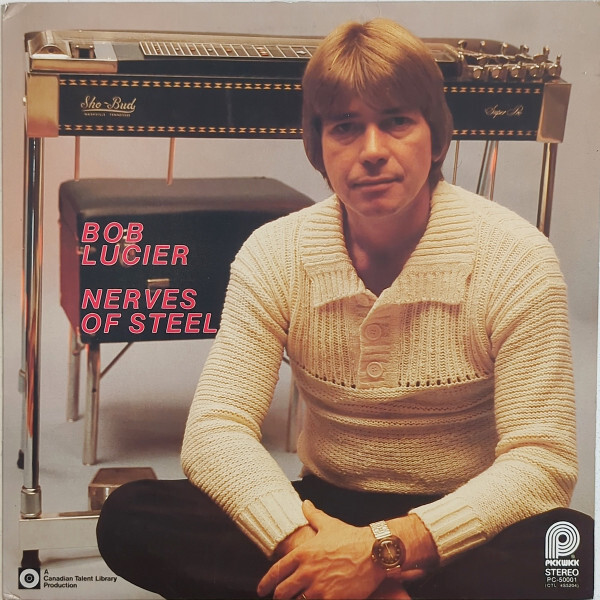
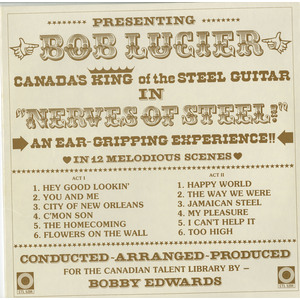
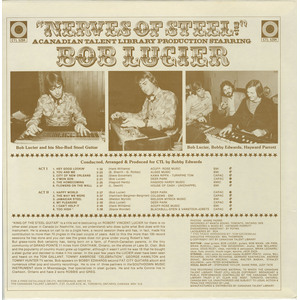
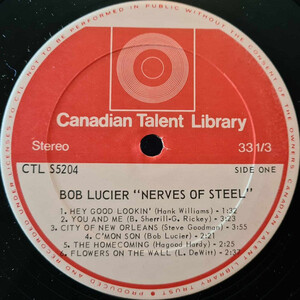
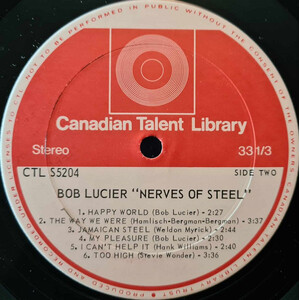
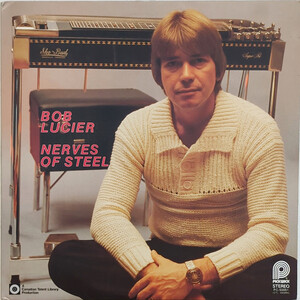
No Comments